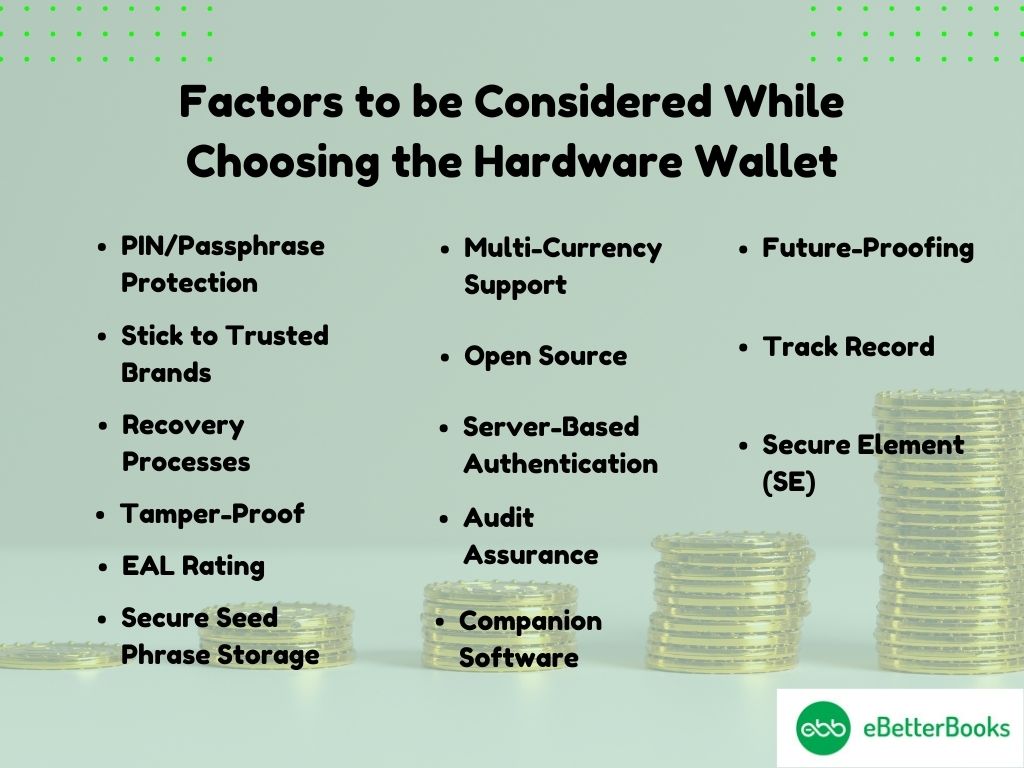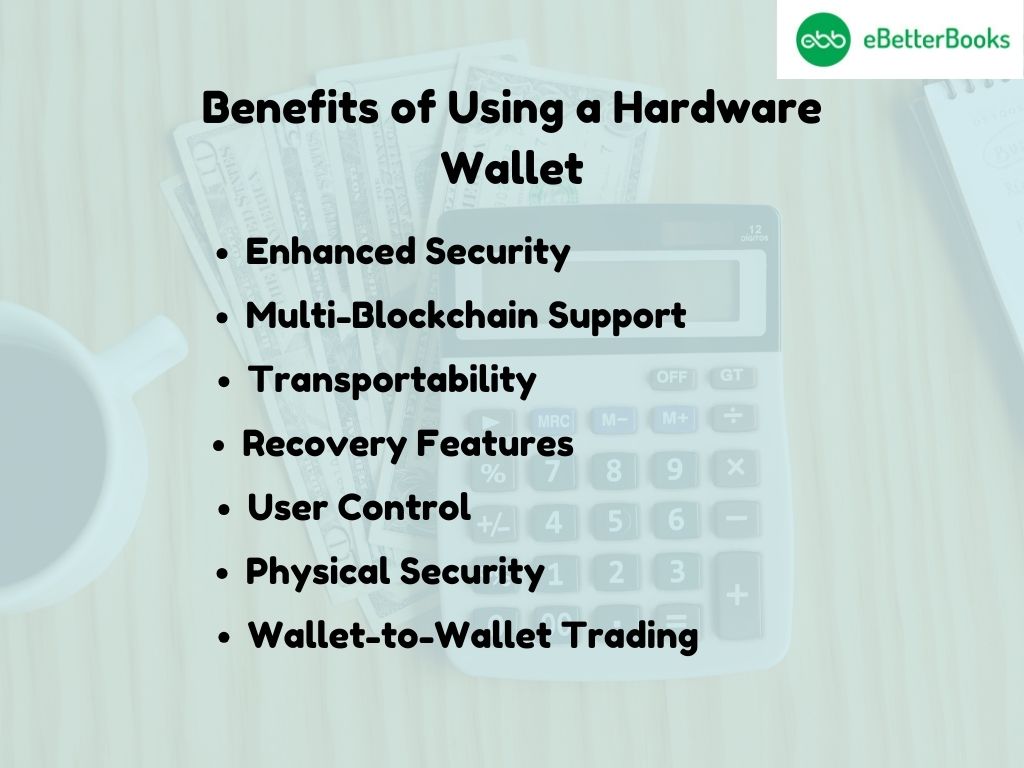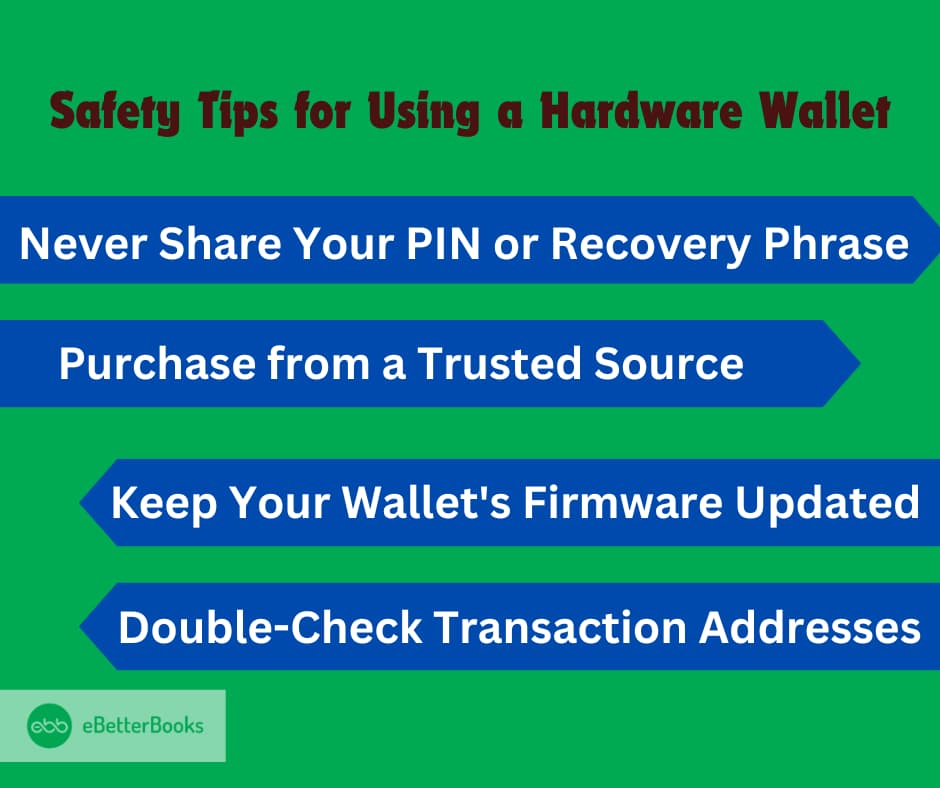Choosing the right hardware crypto wallet is a very crucial part of storing up your private keys for cryptocurrencies and tokens.
While selecting the right hardware crypto wallet users need to consider various checklists – such as wallet model, price, ease of use and specifications as per requirements.
It is also advisable to take the crypto hardware wallet from authorized resellers or manufacturers.
The benefit of having a hardware wallet is that your private keys are stored offline, making them far less susceptible to hacking or malware.
Factors to be Considered While Choosing the Hardware Wallet

Majority of hardware wallets support some of the popular digital assets like Bitcoin, Stable coins, USD coins and Ether.
- PIN/Passphrase Protection: Users should always check the PIN / Passphrase protection. It prevents unauthorized access even if someone gets their hands on physical devices. It acts as an extra layer of protection for the wallet.
- EAL Rating: Users should ensure that the EAL rating is higher, as wallets with higher EAL certainly have more security. Evaluation Assurance Level (EAL) ratings offer an industry-standard measure of security. The higher the EAL rating, the more thorough testing and verification it will undergo.
- Multi-Currency Support: Always select the type of wallet that supports the assets you own or plan to invest in. Many popular wallets often support a wide range of major cryptocurrencies and tokens.
- Companion Software: Users should always check whether the selected wallet is user-friendly. It has a user-friendly wallet management software for easy setup, updates, and transactions.
- Recovery Processes: Wallet users should ensure that the recovery process is well-documented and clear by the wallet manufacturer.
- Secure Seed Phrase Storage: A seed phrase in cryptocurrency is crucial for recovering your funds if you lose access to your wallet. So, the wallet user should consider fireproof/waterproof storage devices for added safety.
- Open Source: Users should always look for hardware wallets that are more transparent and open source. Open source allows for independent security audits and enhances trust.
- Display Screen: A clear screen display lets users review transaction summaries and verify information using a PIN or password. With physical buttons, you can confirm transactions when you’re ready, providing an extra layer of security.
- Stick to Trusted Brands: To avoid fraud and scams, users should always buy the hardware wallet from trusted manufacturers or through an authorized third-party dealer. Also, check the legitimacy of a seller’s website by viewing the quality of its content and double-checking its URL.
- Secure Element (SE): The wallet user should always look for security chips in the hardware wallets. Dedicated security chips that safeguard sensitive information are essential for reputable hardware wallets.
- Server-Based Authentication: Integrating server-based authentication into a hardware wallet enhances security by verifying the integrity of its components during booting. The server communicates with the device, and its response confirms that the components are secure, preventing unauthorized access and potential malicious alterations.
- Future-Proofing: Make sure to always consider wallets that regularly update supported cryptocurrencies to stay aligned with your expanding portfolio.
- Tamper-Proof: Ensure your hardware wallet has a tamper-proof design. Once set up with your seed phrase, it should resist tampering. Any attempts to alter it will leave visible signs, like scratches or damage, indicating unauthorized access.
- Track Record: Always select those companies that have positive customer feedback and a history of reliable security practices.
- Audit Assurance: When a wallet is audited, it undergoes a thorough security check to confirm its legitimacy and trustworthiness. This process acts as a seal of approval, ensuring that your digital assets are safe.
Benefits of Using a Hardware Wallet

When selecting the best hardware wallet for your needs, it’s important to keep these benefits in mind:
- Enhanced Security
A hardware wallet for cryptocurrency transactions offers enhanced security. Hardware wallets are considered cold storage, which means they are offline, making them more resistant to hacking attempts. Your private keys are stored in a secure area of the device that cannot be transferred out, adding an extra layer of protection against online threats.
- Multi-Blockchain Support
Hardware wallets can support multiple blockchains. They can store various types of cryptocurrencies, making them highly versatile. Whether you are dealing with Ethereum, Bitcoin, Lite coin, or others, you can manage all of them from one device.
- Transportability
Hardware wallets are portable and compact. Users can carry them like USB sticks and make transactions anywhere. They offer robust features and functionality, making them a convenient and secure option for managing cryptocurrencies.
- Recovery Features
Hardware wallets come with robust recovery options. If you lose your device or forget your PIN, you can still retrieve your funds using a unique recovery phrase provided during setup. This phrase consists of a series of words that can restore access to your cryptocurrency.
- User Control
Hardware wallets are user-controlled. They give you complete control over your private keys, meaning you fully own your cryptocurrencies. This reduces the risk of loss due to breaches by third parties.
- Physical Security
In addition to digital security, hardware wallets offer physical security. They are equipped with tamper-proof chips similar to those found in passports and credit cards. Even if someone gains possession of your device, they cannot access your funds without your PIN.
- Wallet-to-Wallet Trading
Hardware wallets facilitate wallet-to-wallet trading. This means you can directly transfer your cryptocurrencies to another hardware wallet without going through an exchange crypto. This saves time and transaction fees, making it a cost-effective method for managing your digital assets.
Some Hardware Crypto Wallets Available in Market
Let’s go Know about some Popular Hardware Crypto Wallets Available in the Market:
- Trezor Wallet: Trezor wallets are praised for their robust security. They use advanced cryptographic techniques to protect your private keys, even if your computer is compromised.
- Ellipal Titan: The Ellipal Titan offers air-gapped security and has a tamper-resistant design that erases all data if the device is opened.
- NGRAVE: NGRAVE stands out for its air-gapped security features and custom operating systems that prevent vulnerabilities.
- Ledger Nano X: The Ledger Nano X is a top-tier hardware wallet known for its sleek design and support for over 1,500 cryptocurrencies.
Safety Tips for Using a Hardware Wallet
Hardware wallets are highly secure and provide an excellent option for safely storing digital assets. However, even the best hardware wallet requires additional safety precautions.

- Never Share Your PIN or Recovery Phrase
Do not share your PIN or recovery phrase with anyone. Your PIN unlocks your wallet, while your recovery phrase allows you to restore it on a new device if it is lost or damaged. Always treat this information as highly valuable: write it down, store it securely, and never share it digitally.
- Purchase from a Trusted Source
Always buy your hardware wallet from a reputable source. Many vendors sell counterfeit devices that can be compromised, leading to the loss of your digital assets. Make sure to purchase directly from reputable manufacturers or authorized resellers. Always opt for new devices and avoid buying from auction sites or second-hand sellers.
- Keep Your Wallet’s Firmware Updated
Firmware updates often include security enhancements and fixes for potential vulnerabilities. Most hardware wallet manufacturers release updates regularly, so be sure to monitor official communication channels such as their website, email newsletters, or social media pages for updates.
- Double-Check Transaction Addresses
Always verify transaction addresses before confirming any transactions. Cryptocurrency transactions are irreversible, meaning that mistakes can result in permanent loss. Cybercriminals often use malware to alter copied addresses, tricking you into sending funds to their wallets. Before confirming a transaction, cross-check the address displayed on your hardware wallet with the one on your computer. If they do not match, do not proceed with the transaction.
Conclusion
Choosing the right crypto wallet depends on your specific needs, such as security, asset type support, and ease of use. For those who prioritize security and want control over their assets, hardware wallets are the best option. Hardware wallets provide advanced features, including secure elements and seamless QR code transactions, making it an ideal choice for both beginners and experienced crypto users.
FAQs!
What Type of Wallet is Best for Security?
Software wallets are popular due to their convenience and ease of use. However, they carry risks because your private keys are stored on devices that are connected to the internet, making them more vulnerable to hacks. On the other hand, hardware wallets offer a much safer option by storing private keys offline.
What About Multisig Wallets?
Multisignature (multisig) wallets are a great option for added security and shared account control. They require multiple signatures to approve transactions, protecting your assets if one key is compromised.
Does Wallet Support Multiple Networks?
Not all wallets support multiple blockchain networks; some are limited to a single network, requiring separate wallets for different assets like Bitcoin and Ethereum.
